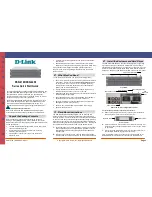
© Copyright IBM Corp. 2011
115
Chapter 10. Spanning Tree Protocols
When multiple paths exist between two points on a network, Spanning Tree Protocol
(STP), or one of its enhanced variants, can prevent broadcast loops and ensure that
the RackSwitch G8000 (G8000) uses only the most efficient network path.
This chapter covers the following topics:
•
“Spanning Tree Protocol Modes” on page 115
•
“Global STP Control” on page 116
•
•
“Rapid Spanning Tree Protocol” on page 126
•
“Multiple Spanning Tree Protocol” on page 127
•
“Port Type and Link Type” on page 129
Spanning Tree Protocol Modes
IBM Networking OS 6.8 supports the following STP modes:
•
Rapid Spanning Tree Protocol (RSTP)
IEEE 802.1D (2004) RSTP allows devices to detect and eliminate logical loops
in a bridged or switched network. When multiple paths exist, STP configures the
network so that only the most efficient path is used. If that path fails, STP
automatically configures the best alternative active path on the network to
sustain network operations. RSTP is an enhanced version of IEEE 802.1D
(1998) STP, providing more rapid convergence of the Spanning Tree network
path states on STG 1.
See
“Rapid Spanning Tree Protocol” on page 126
for details.
•
Per-VLAN Rapid Spanning Tree (PVRST)
PVRST mode is based on RSTP to provide rapid Spanning Tree convergence,
but supports instances of Spanning Tree, allowing one STG per VLAN. PVRST
mode is compatible with Cisco R-PVST/R-PVST+ mode.
PVRST is the default Spanning Tree mode on the G8000. See
for details.
•
Multiple Spanning Tree Protocol (MSTP)
IEEE 802.1Q (2003) MSTP provides both rapid convergence and load balancing
in a VLAN environment. MSTP allows multiple STGs, with multiple VLANs in
each.
MSTP is supported in stand-alone (non-stacking) mode only.
See
“Multiple Spanning Tree Protocol” on page 127
for details.
Summary of Contents for RackSwitch G8000
Page 1: ...RackSwitch G8000 Application Guide...
Page 2: ......
Page 3: ...RackSwitch G8000 Application Guide...
Page 16: ...16 RackSwitch G8000 Application Guide...
Page 22: ...20 RackSwitch G8000 Application Guide...
Page 23: ...Copyright IBM Corp 2011 21 Part 1 Getting Started...
Page 24: ...22 RackSwitch G8000 Application Guide...
Page 54: ...52 RackSwitch G8000 Application Guide...
Page 55: ...Copyright IBM Corp 2011 53 Part 2 Securing the Switch...
Page 56: ...54 RackSwitch G8000 Application Guide...
Page 92: ...90 RackSwitch G8000 Application Guide...
Page 94: ...92 RackSwitch G8000 Application Guide...
Page 144: ...142 RackSwitch G8000 Application Guide...
Page 145: ...Copyright IBM Corp 2011 143 Part 4 Advanced Switch ing Features...
Page 146: ...144 RackSwitch G8000 Application Guide...
Page 148: ...146 RackSwitch G8000 Application Guide...
Page 182: ...180 RackSwitch G8000 Application Guide...
Page 184: ...182 RackSwitch G8000 Application Guide...
Page 212: ...210 RackSwitch G8000 Application Guide...
Page 258: ...256 RackSwitch G8000 Application Guide...
Page 286: ...284 RackSwitch G8000 Application Guide...
Page 294: ...292 RackSwitch G8000 Application Guide...
Page 298: ...296 RackSwitch G8000 Application Guide...
Page 310: ...308 RackSwitch G8000 Application Guide...
Page 311: ...Copyright IBM Corp 2011 309 Part 7 Network Management...
Page 312: ...310 RackSwitch G8000 Application Guide...
Page 320: ...318 RackSwitch G8000 Application Guide...
Page 332: ...330 RackSwitch G8000 Application Guide...
Page 334: ...332 RackSwitch G8000 Application Guide...
Page 345: ...Copyright IBM Corp 2011 343 Part 9 Appendices...
Page 346: ...344 RackSwitch G8000 Application Guide...
Page 357: ...Copyright IBM Corp 2011 Appendix C Notices 355 Taiwan Class A compliance statement...
















































